
A chinaware is on exhibition at Jibaozhai Museum in Jizhou, Hebei province. The museum closed down last month because it "was not legally approved by the supervision department".(Xinhua /Wang Min)
To a casual observer, the collection at Jibaozhai Museum may have appeared to be a treasure trove. Its walls were lined with priceless relics from Chinese palaces and rare chinaware.
Yet novelist Ma Boyong smelled a rat. After visiting the museum, he used his blog to accuse the privately owned museum of exhibiting worthless forgeries.
For a start, he wrote on July 7, its animal head sculptures, similar to those looted in the 1800s from Yuanmingyuan, the Old Summer Palace in Beijing, are porcelain, not bronze.
"One set had breasts, and another set had tunics," wrote Ma, who has penned several books of historical fiction. He said it was hard to believe they were made in the Yuan Dynasty (1271-1368).
It was not long before the attraction, which opened in Hebei province's Jizhou in 2010, was one of the hottest topics online.
In response, Wei Yingjun, a consultant to the museum, insisted at least half of its 40,000 pieces were genuine relics, although experts had never appraised them due to a lack of funds.
Three days after Ma's blog post, the museum was closed down because it "was not legally approved by the supervision department", according to Li Baocai, director of museums for the Hebei Cultural Relics Bureau.
However, that swift action by authorities did not prevent netizens from questioning China's management of private museums, which experts say is lax and poses a major obstacle to the culture industry.
Free appraisals
Calls to Wei have gone unanswered since the closure. Previously, however, he said the museum was visited by 3,000 students a year and had been classed by the city as a Grade 3A scenic spot and "a patriotic education center".
